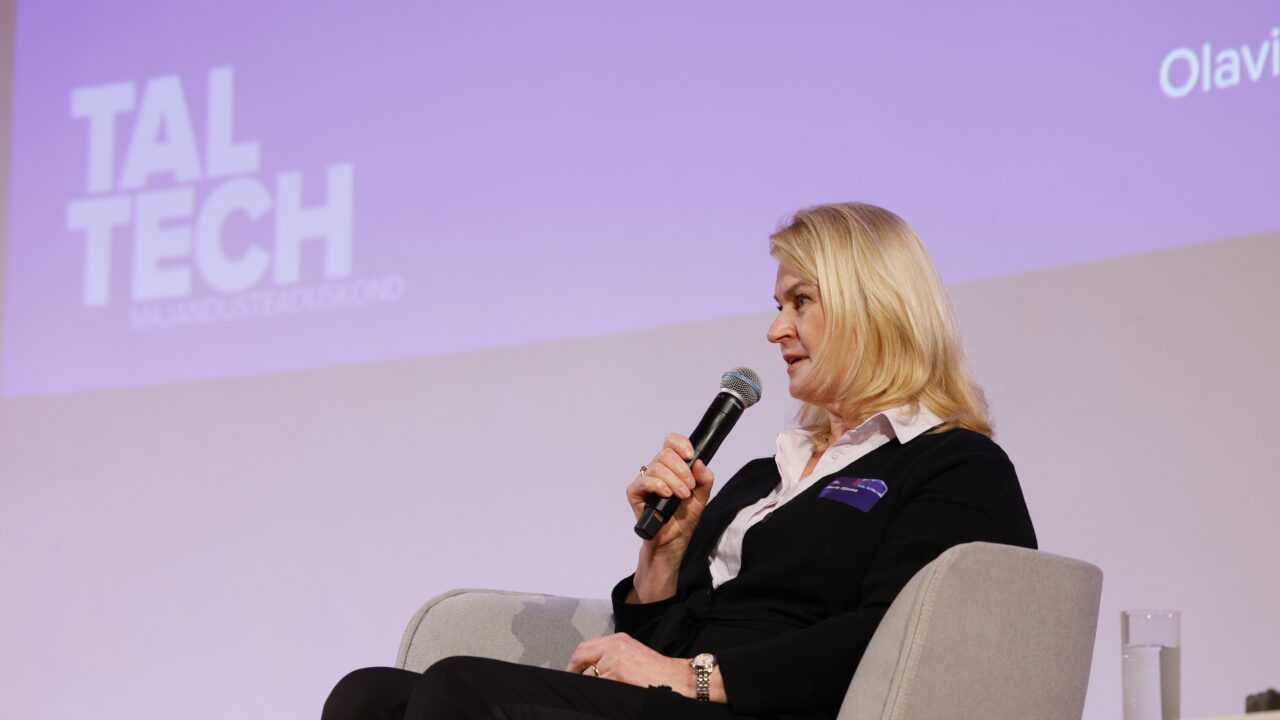At the panel discussion, insights came from Olavi Lepp, CEO of Swedbank Estonia; Riin Savi, TalTech board member and ESG lead at private equity fund BaltCap; Merle Ojasoo, associate professor at TalTech’s Department of Business Administration; and Laivi Laidroo, associate professor at TalTech’s Department of Economic Analysis and Finance.
ESG – not just a trend, but business ethics
Panelists agreed that sustainability is more than just a passing trend. Merle Ojasoo noted that while ESG has become a buzzword in the last 5–7 years, it is not new. “ESG is nothing more than good old business ethics,” she remarked.
Riin Savi pointed out that the financial sector has been considering ESG for decades: “At some point, it became overhyped, but now it seems like the excess air is coming out.” From a business perspective, she emphasized that ESG enhances competitiveness, ensures long-term profitability, and raises awareness of corporate impact.
Olavi Lepp stressed the importance of balance: “For me, sustainability is about balancing environmental, social, and other aspects.” He also highlighted that sustainability reporting is only valuable if it drives decision-making: “There’s no point in reporting just for the sake of it.” For example, he explained how Swedbank integrates ESG reports into its credit and investment processes, influencing decisions and channeling resources into more sustainable projects.
Laivi Laidroo added that companies should internalize ESG reporting and align it with their strategy: “Even when reporting is mandatory, businesses should maximize its value to help achieve their goals.”
“There’s no point in reporting just for the sake of it.”

According to Merle Ojasoo, ESG is nothing more than good old business ethics. Photo: Egert Kamenik
Measure what can truly be changed
Riin Savi highlighted the complexity of ESG reporting – various investors and stakeholders demand structured data, increasing administrative burdens and raising the question of whether it all creates real value.
A key issue is the lack of transparency – who benefits from the collected and reported data? “We often ask ourselves, why are we doing this?” Savi remarked.
Olavi Lepp emphasized the need for balance, focusing on material reporting aspects and providing feedback to regulators to ensure that rules remain practical. “It is crucial to balance detailed reporting and actual benefits,” he noted. Selecting the wrong indicators can reduce motivation if employees and management don’t see a way to influence the results.
“It is crucial to balance detailed reporting and actual benefits.”
Laivi Laidroo pointed out that most ESG metrics used in corporate management focus on short-term results, which can distort the accurate picture of a company’s sustainability efforts. If metrics fail to reflect long-term impact, structural changes in ESG often go unnoticed.
Merle Ojasoo added that the effectiveness of ESG goals depends on balance in corporate leadership. If targets are too ambitious or unrealistic, they may lead to unethical or corrupt practices, where dishonest measures are used to meet imposed goals.

According to Olavi Lepp, a sustainability report is valuable only if it drives decision-making. Photo: Egert Kamenik
ESG: a barrier or an opportunity?
The global context also emerged as a key discussion point. For example, the American companies largely followed investors’ ESG requirements a few years ago, but attitudes are now shifting.
Olavi Lepp noted: “More and more US companies are saying that if investors don’t like their environmental footprint, they’ll simply look elsewhere – because there’s no shortage of money in the world.”
“More and more US companies are saying that if investors don’t like their environmental footprint, they’ll simply look elsewhere – because there’s no shortage of money in the world.”
The US has realized that investors are always willing to fund companies with less stringent ESG requirements. In China and other regions, regulatory pressure for ESG compliance is more lenient, making it easier to secure investments that don’t necessarily meet strict sustainability criteria. While this shift hasn’t fully reached Europe yet, Lepp suggested it may only be a matter of time.
Merle Ojasoo sees education and awareness as part of the solution: “The younger generation increasingly demands actions that ensure a safe and clean environment for their future.”
Riin Savi emphasized that companies must assess and actively manage their impact but questioned whether EU regulations support this process. “The more we discuss and raise awareness about ESG reporting, the better we can find a common language and avoid resistance. More importantly, this discussion allows us to see ESG as an obligation and as part of value creation – enhancing corporate sustainability and competitiveness.”

According to Riin Savi, the more we discuss and raise awareness about ESG reporting, the better we can find a common language and avoid a situation where everyone resists change and refuses to act. Photo: Egert Kamenik
Reporting that truly supports sustainable change
The panel concluded that ESG reporting is here to stay. While businesses may initially see it as a burden, it enhances transparency and improves management practices in the long run.
Merle Ojasoo emphasized that ESG reporting should not be an end in itself – it must reflect actual actions and changes within companies. The evolution of regulations and automation in reporting could make the process smoother and reduce administrative burdens.
Ultimately, the true impact of sustainability reporting depends on how healthy companies integrate it into their strategies and whether regulations support real change rather than just adding bureaucratic complexity. Time will tell whether ESG reporting becomes a powerful management tool or remains a formality.




